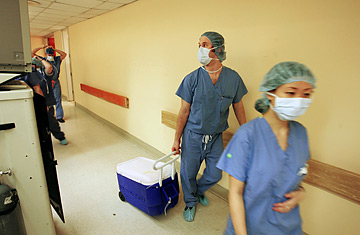
Doctors at New York-Presbyterian/Columbia Hospital receive lungs from a potential donor.
Americans love a square deal. The idea of the quid pro quo, the something for something, lies at the heart of our very sense of fairness. But there's one area in which something for nothing is much closer to the rule, and it's a transaction on which people's very lives turn: organ donation.
About 90% of Americans say they support organ donation, but only 30% have actually signed up to part with their parts after they die. The cost of such an all-take, no-give setup is high. Nearly 100,000 patients in the U.S. are idling on the United Network for Organ Sharing (UNOS) matching list, waiting for a donor--and 18 a day will die waiting. The recent hoax in the Netherlands, in which reality-show contestants pretended to compete for an organ from a dying woman, was an effort to draw attention to the global scope of the problem. Dave Undis thinks he has a better solution.
A former insurance executive, Undis is the founder of the Nashville-based nonprofit Lifesharers. Launched in 2002, Lifesharers is a no-fee network of about 9,000 members nationwide who have pledged to donate their organs when they die--but only to other members on the list. To avoid "freeloaders"--as Undis calls them--you must have signed up at least 180 days before you're ill.
In a population of 300 million, the Lifesharers membership is tiny, and so far no member of the group has received an organ from another member. But Undis believes that as a proof of principle, Lifesharers shows how to fix the donor mess. If UNOS demanded what Lifesharers does and patients were required to register before they fell ill, he believes, the nation could essentially eliminate its organ shortage within three years. "It's a fair trade," he says. "I'll give you mine if you give me yours."
The idea of this ultimate in gated communities gives a lot of people pause. For one thing, Undis admits, for the system to do what he promises, he would need 85% of Americans to sign on, not likely in a country that rarely reaches that kind of near unanimity on anything. What's more, Dr. Donald Landry, a nephrologist at Columbia University, points out there are people who consciously don't register for organ donation for religious and other reasons, and it would be unfair to press them on their beliefs. Most folks, however, hesitate simply because they don't want to face their own mortality, preferring to leave the postmortem choice to their loved ones. Reciprocity would force the issue earlier, and despite his misgivings, Landry believes that's a good thing. "You may never need a new kidney," he says, "but a lot of people aren't going to risk not having that extra insurance just in case."
One thing that might trip up the entire Lifesharers concept is that the idea behind it--fairness--can also argue against it. Elisa Gordon, a bioethics professor at Albany Medical College in New York State, notes that socioeconomics and health are linked, and some poor people may never be healthy enough to qualify as donors. "No other patients seeking medical treatment are required to give back anything beyond money for the costs of treatment," Gordon says.
Undis disagrees, arguing that there is now no criterion for becoming a donor beyond signing up at your local Department of Motor Vehicles. He concedes that some exceptions would have to be made, but he maintains that giving an organ to a non-donor is "like giving the lottery jackpot to someone who didn't buy a ticket." Sadly, the odds of winning an organ under the current rules seem only slightly better.
